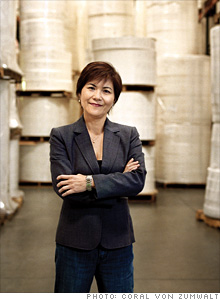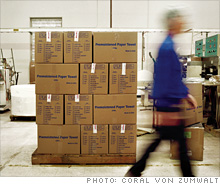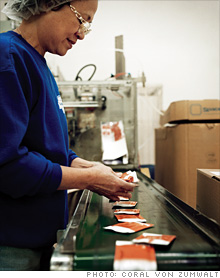Delegate smart
I avoided hands-on management - until my firm spun out of control.
 |
| Eve Yen |
 |
| Boxes of wipes await shipment to a restaurant. |
 |
| A production team member collects wet-wipe packets for inspection. |
(Fortune Small Business) -- When I founded Diamond Wipes International, hot hand towels were a new phenomenon in American restaurants. I had moved to the U.S. from Taiwan because I wanted my daughter to get a good education, but I saw a business opportunity in the largely untapped market for disposable moist napkins. In 1995 I put together a production process, hired a secretary and brought in two machine operators who manufactured about 4,000 wrapped towels a day.
The company has grown rapidly. Today our 100 employees operate 40 production lines that churn out 3 million units daily. Our offerings have also grown: We now make private-label and branded wipes that are premoistened with sunblock, makeup remover or disinfectant for use in the cosmetics, health-care and janitorial industries.
The changes have been exciting but also nerve-racking. Between 2002 and 2003 sales increased 82%, to $9 million. By 2006, I had started to worry that the company might not be able to cope with more expansion. Our small sales team was overworked, interdepartmental communication was poor, and I had no way to monitor every worker's daily performance. Meanwhile, our inventory system was inefficient; paperwork was often duplicated, and some parts of the system were too dependent on manual processes, which led to costly mistakes.
One time the sales and art departments created a new custom package design for a client. Somehow that information never reached the warehouse, where employees kept ordering the old packaging. That error cost us 200 cases of wipes - and the goodwill of the client, whose delivery was severely delayed. Similar incidents happened two or three times a year, costing us about $100,000 annually.
I decided to take action. In late 2006 I hired a general manager and told him that his mission was to turn the company into a well-oiled machine. I asked him to coordinate the work of all departments, to make sure they communicated with one another and to report to me on their performance.
That was just the beginning. Within a few months I had hired three new department managers and four office assistants. In February 2007 I installed a new computer system and put the entire staff through multiple training sessions to learn how to use it. As if that weren't enough to deal with, I also redesigned the packaging for my La Fresh brand.
It was a chaotic year. My ideas were good but poorly implemented. No one had time to train the department heads - they had to learn on the job. And the office assistants had been hired hastily because I needed more staff to answer the phones. But their tasks also included inputting orders, which required attention to detail. Three of them, it turned out, were not up to the job, and I had to let them go.
My general manager was less effective than I'd hoped. He was a good guy, but he had trouble enforcing deadlines. As a result, I didn't get the reports or see the numbers I expected from him. Sometimes I felt as if I didn't know what was going on. Eventually I let him go, too.
That year was costly, both in stress and in dollars (all the hiring and firing probably set us back about $150,000). But it helped me view things differently. With hindsight, I could see that the general manager's failures reflected some of my own. I realized that it wasn't enough to be the entrepreneurial, creative force behind my company. If I didn't learn how to manage my own organization, it would fail.
I stepped in and took back control. I did some research and decided which key numbers I wanted to see from each department every day, such as the defect rate. Those are the figures we now use to understand each department's daily performance. We routinely make adjustments to improve them.
Over the past two years, I've trained myself to be a decent general manager. I'm still planning to hire someone for the job, but at least now I know exactly what to ask of him or her. I've also learned to prioritize my to-do list. We may need more of everything, but more of everything at once is not a good idea.
Here's the irony: After we jumped through all those hoops to prepare the company for growth, our 2008 sales were flat at $15 million, largely because the price of raw materials skyrocketed unexpectedly and then the economy tanked.
This year, however, I'm aiming to increase sales by 15%. I think my firm and I are ready for it. Growing without chaos is difficult, but we're building the systems that will keep us on track. ![]()
-
The Cheesecake Factory created smaller portions to survive the downturn. Play
-
A breeder of award-winning marijuana seeds is following the money and heading to the U.S. More
-
Most small businesses die within five years, but Amish businesses have a survival rate north of 90%. More
-
The 10 most popular franchise brands over the past decade -- and their failure rates. More
-
These firms are the last left in America making iconic products now in their twilight. More








